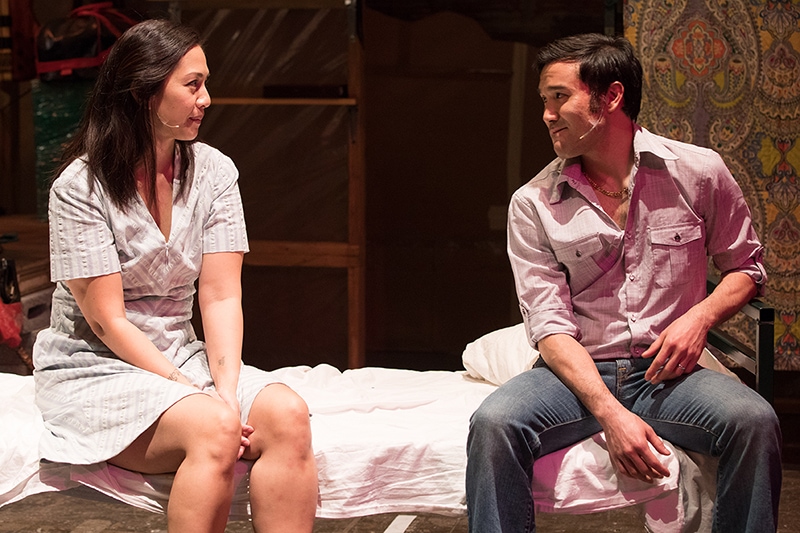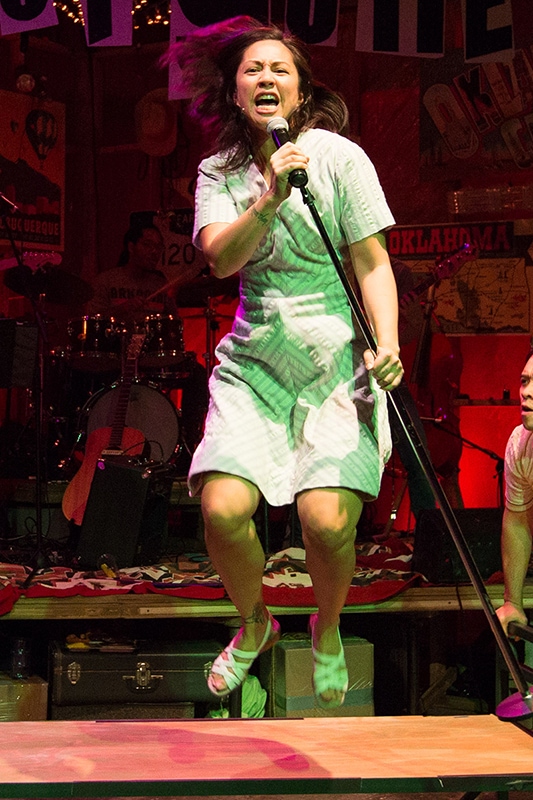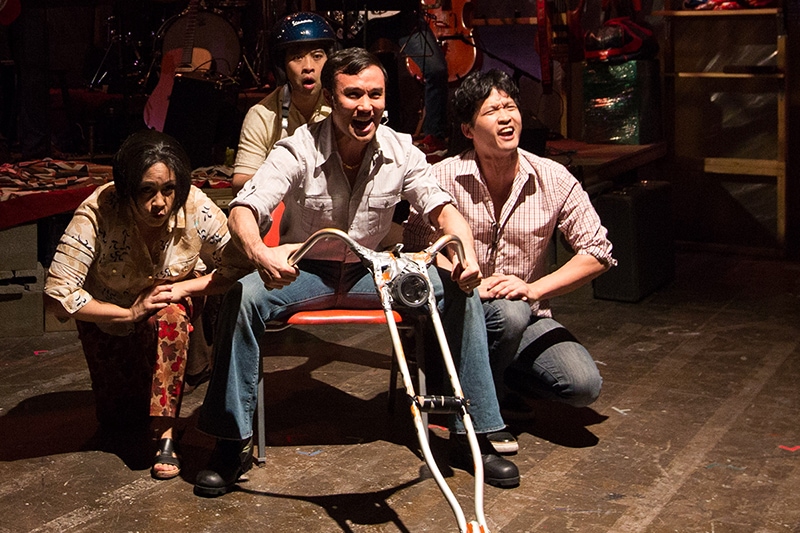There is so much in this show to flip over, you could be dizzied by its delights. The fantastical story and kooky characters, the wicked humor and badass music, the frisky cast and musicians, the far-out design and direction—it’s a full-on fusion of fun.
But it’s much, much more.
In Vietgone, Vietnamese-American Playwright Qui Nguyen sets out to tell how his parents fell in love after being resettled in America as refugees after the fall of Saigon. Nguyen, a practitioner of geek theater and a screenwriter for Marvel Studios, embellishes their romance with the wildest pastiche of pop culture I can recall seeing on a DC stage. He drops in this and that from comic books, Hollywood movies, hip-hop, cartoons, sit-coms, farce, kung fu fighting, sex comedies, you name it. Incredibly, it all coheres.
Scenic Designer Tony Cisek has transformed Studio Theatre’s fourth floor into something like a funky garage or unfinished shelter with a bandstand upstage, huge billboard-type placards on the wall representing Arkansas, New Mexico, Texas, Oklahoma, Arizona, California; a jumble of luggage, guitars, and other set dressing including a map of Saigon. A sign lights up that says Fort Chaffee—the real-life site of the refugee camp in Arkansas where in 1975 Tong, the playwright’s mother, and Quang, his father, met. Both 30 years old at the time, they were, as Jacob Yeh playing the Playwright tells us, “both survivors of a conflict that’s been raging in some form or fashion their entire lives.”

Tong (a fierce and feisty Regina Aquino) got airlifted out of Saigon with her mother, Huong (a slyly amusing Eileen Rivera), leaving behind not only her brother but her fiancé—whom she knows she will not see again.
Quang (a ruggedly robust Marc Delacruz), a pilot trained in the United States, flew a helicopter out of Saigon full of escaping Vietnamese but with no room for his wife and two kids—whom he wants dearly to return to.
The obstacles Quang and Tong face, and the complications in their courtship, have been cast by Nguyen into witty situational comedy and intense dramatic confrontations that jump back and forth in time and are by turns hilarious and deeply affecting.
Nguyen’s nimble balancing of light and dark shines throughout, as for instance in an exchange between Tong and her mom, who is unimpressed with their Fort Chaffee accommodations.
Huong: I thought we’d have our own rooms at least.
Tong: It’s a refugee camp, mom. It’s not a hotel.
Huong: I know it’s not a hotel. I just thought—well, it’s America. I thought everything would be super nice here in America. That’s sorta what they advertise.
Not long after that laugh line, the play’s motif of rescue from certain danger appears.
Tong: Mom, I didn’t “drag you here”. We were days away from being overrun by the Viet Cong, my job at the embassy offered me two tickets to America, I gave you one of those tickets—to, you know, SAVE YOU.
Huong: You saved me?
Tong: Yes. I saved you. This is the act of being saved.

The play is studded with terrific rock songs with lyrics by Nguyen, Music Director Jeff Song, and Andy Santospago, and original rock/pop/funk/psychedelic music by Santospago and members of the ace band The Vietgoners—Song (bass/vocals), Jonathan Hawkins (guitars/banjo/mandolin/vocals), and Keith Butler, Jr. (drums/percussion/vocals).
Many of the stories told in the songs are emotionally raw and the actors sing the guts out of them. For instance, Quang and Tong have a number called “Home” in which they have the same lyrics but with strikingly different meaning. Quang takes the stage solo with a chorus that goes:
HOME.
I’LL MAKE IT HOME.
By which Quang means “I’ll make it back to my homeland.” Tong then joins Quang onstage and sings a nearly identical verse except that for her the “I’LL MAKE IT HOME” chorus means “I’ll make this place my new homeland.” That’s some powerful musical storytelling. And wait till you hear Aquino belt out Tong’s “Don’t Give a Shit.”

The show is rife with humor, a lot of it uproariously broad and bawdy, and some of the edgiest makes fun of America. Early on, for instance, there’s a road-trip scene between Quang and his buddy Nahn (a wonderfully wacky Joe Ngo), during which they travel by motorcycle to California on account of Quang’s cockamamie plan to get back to Vietnam. On the way, they talk of this and that.
Quang: Americans aren’t huge fans of peeps like you and me.
Nahn: Bullshit. Why would they send so many troops over if they didn’t like us?
Quang: Listen, man, I spent 18 months here in ’68 learning how to fly down in Lacklund Airforce Base. They barely like each other. Look how the white ones treat the black ones here and they’re all from the same country.
Nahn: That is nutbags.
Quang: This is why we need to get home. North and South Vietnam may be at war, but at least we’re not fighting each other over something as stupid as the way we look.
Nahn: Word.
And not a few of the show’s jests are gentle ribbing of white Americans. “Yo what’s up white people,” exclaims Tong to the audience at the top of the show. And Yeh’s caricatures of white guys are a hoot—among them a crybaby blond-wigged airman who longs for Tong, a bearded Hells Angels biker brute who runs the uneasy raiders off the road, and a long-haired airhead hippie who can’t stop apologizing for the Vietnam War.
The era is captured winkingly. There’s a haze-filled scene with mary jane. There’s bed-hopping galore. (Tong keeps plucking Quang’s shirt open before they get it on.) Recognizable bits from movies like Ghost and The Matrix get big laughs.
Costume Designer Frank Labovitz gets the comic-book look yet keeps the characters believable. Lighting Designer Heather T. Gilbert lends a fantasy fun-house feel. Fight Director Robb Hunter gives a mock martial-arts scene the perfect comic punch. And with her infamous imagination and verve, Director Natsu Onoda Power shapes all the inspired bits and pieces into a whole that ultimately lands with stunning impact.
It happens in the last scene, between Quang, now elderly, being interviewed by his son for a play he wants to write about his father and mother. Their talk turns to the Vietnam War and America’s role in it as seen from the point of view of those for whom the war came to them. These people—including Quang and Tong, without whom there would not be this Playwright—were reliant on America for rescue from the imminent danger posed by the Viet Cong. It is a powerfully written scene that articulates and invites a fundamental recalculation of why we were in Vietnam.
By the end, Vietgone does something so beyond entertaining, so unexpected and unforgettable, that I not only left the theater with my mind blown. I left with my mind changed.
Running Time: Two hours 30 minutes, including one intermission.
Vietgone plays through May 20, 2018, at Studio Theatre – 1501 14th Street NW in Washington, DC. For tickets, call the box office at (202) 332-3300, or purchase them online.





